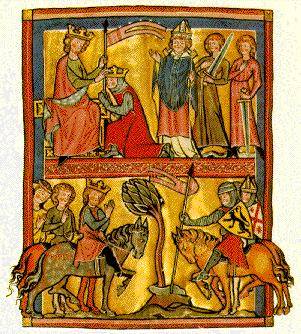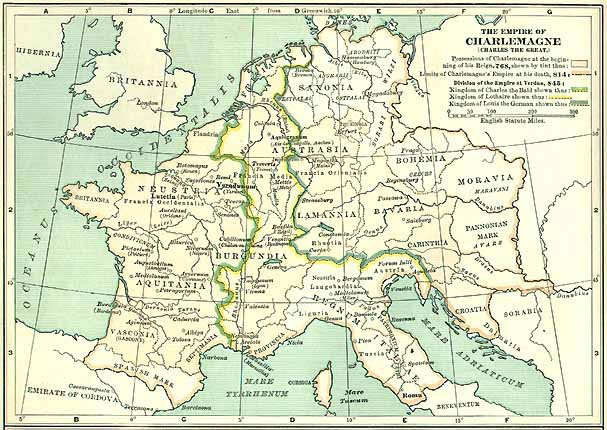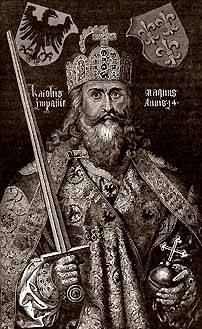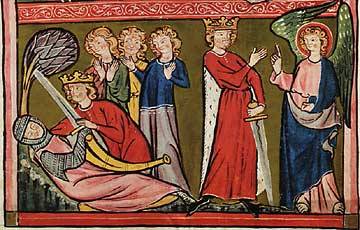

732- Charles Martel defeats the Muslims in the battle of Tours, where they had penetrated deep within the Frankish kingdom.
742- Charlemagne born
768- Carolus Magnus (Charlemagne) succeeds father, Pepin (741-768). According to old Frankish custom, the kingdom was divided between Charles and his brother, Carloman.
771 -- became the sole ruler of the Frankish kingdom after Carloman's death. His empire will include the areas already conquered by the Franks and great parts of central Europe, central and northern Italy. Charlemagne promotes the expansion and administration of his kingdom by the use of local counts overseen by Charlemagne's representatives. A revival and reform of learning and the church took place (the Carolingian Renaissance) under Charlemagne directed by an Anglo-Saxon Benedictine named Alcuin (a student of Bede). Establishes schools in monasteries in his kingdom.
772 - Charlemagne's wars with the Saxons in the north begin and in 804, Saxonia is conquered.
773- Invades Italy, defeats Lombards.
778 - Charlemagne enters Spain. Fails to take Saragossa. He destroys Pamplona. On returning to France his rearguard suffers destruction as the hands of mostly Basques at the pass of Roncesvalles, basis for French epic, Song of Roland (Anonymous, language: Old French, written perhaps as early as the middle 11th century). In a later campaign Charlemagne would secure Navarre and part of northern Spain called the Spanish March (a buffer zone between Franks and Moors.
782 - Charlemagne suffers attacks from the Saxons.
800 - Charlemagne is coronated emperor of the Holy Roman Empire at Christmas. Political and Religious unity of Europe (a major event in the development of Europe; imperium, ecclesia, and gentes), marks the beginnings of a Europe distinct from both Byzantium and Islam; a union of the Roman and the German, of the Mediterranean and the northern civilizations.
802 - Charlemagne establishes his court at Aachen (Aix-la-Chapelle). Gathers together many scholars to make his court a center of learning. Alcuin develops the Palace School. Charlemagne orders old sagas of the Franks be written.. Also engaged in a series of construction projects: a cathedral in Revenna, a 500 foot bridge over the Rhine River, thermal baths.
814- Charlemagne dies, son, Louis the Pious succeeds him; and who will later divide the empire between his sons that will lead to the demise of the Carolingian empire..

Map and image of Charlemagne below are from: http://www.culturalresources.com/MP_Century17.html
Carolingian Renaissance (from: http://www2.una.edu/dburton/charlemagne_ov_h420_outline.htm)
A) A Very Practical "Renaissance" - for Survival.
1) Gathering Scholars.
2) Purposes: A Trained Clergy & Biblical Studies.
B) Establish Monastic & Cathedral Schools.
C) Uniformity & Standardization across Empire:
1) Uniform Curriculum.
2) Uniform Scriptoria - copying manuscripts.
3) Uniform Handwriting - Carolingian minuscule.
4) Uniform Trained Clergy.
5) Uniform Version of Bible - Alcuin.
Description of Charlemagne from Einhard's The Life of Charlemagne

"Charles was large
and strong, and of lofty stature, though not disproportionately tall (his height
is well known to have been seven times the length of his foot); the upper part
of his head was round, his eyes very large and animated, nose a little long,
hair fair, and face laughing and merry. Thus his appearance was always stately
and dignified, whether he was standing or sitting; although his neck was thick
and somewhat short, and his belly rather prominent; but the symmetry of the rest
of his body concealed these defects. His gait was firm, his whole carriage
manly, and his voice clear, but not so strong as his size led one to expect. His
health was excellent, except during the four years preceding his death, when he
was subject to frequent fevers; at the last he even limped a little with one
foot. Even in those years he consulted rather his own inclinations than the
advice of physicians, who were almost hateful to him, because they wanted him to
give up roasts, to which he was accustomed, and to eat boiled meat instead. In
accordance with the national custom, he took frequent exercise on horseback and
in the chase, accomplishments in which scarcely any people in the world can
equal the Franks. He enjoyed the exhalations from natural warm springs, and
often practised swimming, in which he was such an adept that none could surpass
him; and hence it was that he built his palace at Aixla-Chapelle, and lived
there constantly during his latter years until his death. He used not only to
invite his sons to his bath, but his nobles and friends, and now and then a
troop of his retinue or body guard, so that a hundred or more persons sometimes
bathed with him."
Einhard's description of the Spanish Expedition
"In the midst of this vigorous and almost
uninterrupted struggle with the Saxons, he covered the frontier by garrisons at
the proper points, and marched over the Pyrenees into Spain at the head of all
the forces that he could muster. All the towns and castles that he attacked
surrendered. and up to the time of his homeward march he sustained no loss
whatever; but on his return through the Pyrenees he had cause to rue the
treachery of the Gascons. That region is well adapted for ambuscades by reason
of the thick forests that cover it; and as the army was advancing in the long
line of march necessitated by the narrowness of the road, the Gascons, who lay
in ambush [778] on the top of a very high mountain, attacked the rear of the
baggage train and the rear guard in charge of it, and hurled them down to the
very bottom of the valley. In the struggle that ensued they cut them off to a
man; they then plundered the baggage, and dispersed with all speed in every
direction under cover of approaching night. The lightness of their armor and the
nature of the battle ground stood the Gascons in good stead on this occasion,
whereas the Franks fought at a disadvantage in every respect, because of the
weight of their armor and the unevenness of the ground. Eggihard, the King's
steward; Anselm, Count Palatine; and Roland, Governor of the March of Brittany,
with very many others, fell in this engagement. This ill turn could not be
avenged for the nonce, because the enemy scattered so widely after carrying out
their plan that not the least clue could be had to their whereabouts."
